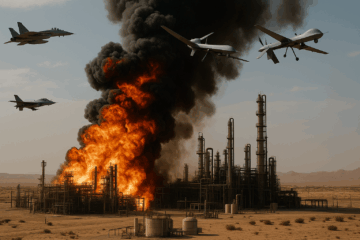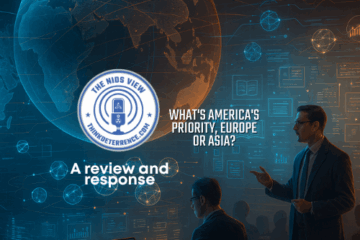In the Middle East, the necessity for an anti-Iran alliance is apparent. Iran’s aggressive foreign policy, support for terrorism, and pursuit of nuclear capabilities continue to pose a significant threat to regional stability and global security. As a result, the formation of a united front comprising key Middle Eastern nations and the West, led by the United States, is critical in deterring Iran, countering its destabilizing behavior, and promoting peace in the region.
The recent helicopter accident, which claimed the lives of Iran’s president and foreign minister, is expected to have an adverse effect on the region soon. The incident is already drawing international attention, with many countries closely evaluating the potential implications for regional security. The incident also occurred in an already geopolitically tense context after a month of confrontation with Israel.
The death of Iran’s foreign minister, Amir Abdollahian, will complicate Iran’s foreign policy, international relations, and diplomatic engagements. Abdollahian was instrumental in critical negotiations, including the deal with the Kingdom of Saudi Arabia (KSA) that was brokered by China in February–March 2023 and indirect talks with the United States via Oman, regarding key topics related to regional escalation in the Middle East—including Yemen’s Houthi attacks as well as Iran’s nuclear developments. Anticipating the development of these discussions is crucial, as it is likely to impact Iran’s foreign policy and engagements.
The death of Iran’s president, Ibrahim Raissi, also poses a test for Iran’s internal stability and order. Middle East instability since October 7, 2023, makes this incident even more significant. Thus, how events in Iran unfold in the coming weeks have domestic and regional consequences, including the direction of Iran’s proxies in the region. Conspiracy theories are circulating in Iran as to who was responsible for the crash.
Even though Ayatollah Ali Khamenei, Iran’s supreme leader, is the country’s actual ruler and the presidential position has limited authority, Raissi’s death thrusts Iran into an uncertain future. Experts believe that Raissi, 63, was preparing to succeed the 85-year-old supreme leader. They also believe that Raissi and Khamenei’s son, Mojtaba Khamenei, are potential successors to the supreme leader. This suggests that Mojtaba, known for his strong ties to Iran’s military and intelligence services, as well as to Iran’s Revolutionary Guard Corps (IRGC), is a strong contender.
Iran’s constitution mandates the temporary assumption of the presidential role by Mohamed Mokhber, the first vice president, and the holding of elections within 50 days. Regardless of the timing and identity of Iran’s next president, the informally chosen successor to the supreme leader is likely to delay such elections. The unpredictability of the country’s overall course poses a significant risk and threat to the region, as there is a possibility that Iran may adopt a more assertive stance in response to recent events, thereby demonstrating its power to the international community. Of course, the actions of its proxies in the region and advancements in the nuclear program already signal this, which necessitates an anti-Iran alliance.
The absence of an anti-Iran alliance is perhaps explained by what political scientist Randall Schweller referred to as “under-balancing” or the inability or unwillingness of nations to form the kind of blocking alliances that the balance of power theory would predict. This also sheds light on why states facing threats fail to recognize present dangers and do not react or respond except in a minimal way.
Iran appears to be the winner of recent escalations. Maritime safety in the Red Sea is low because of Houthi militias. Iran is also the most influential player in Iraqi politics and controls Shiite militias. Iranian influence in Syria is one of the main reasons Syrian autocrat Bashar al-Assad remains in power. Furthermore, in Lebanon, Iran-controlled Hezbollah remains the dominant force in Lebanese politics and probably the main first line of defense for Iran in the region.
Iran’s continued support for militant groups across the Middle East amplify the urgency of an anti-Iran alliance. The Iranian regime already has a long history of providing financial, military, and logistical assistance to terrorist organizations. These groups not only undermine the sovereignty of their host countries, but they generate violence, chaos, and instability. For example, Houthi attacks on commercial vessels in the Red Sea and Gulf of Aden over the past few months have significantly impacted maritime safety. In this regard, the US called on Iran to halt “unprecedented weapons” transfers to the Houthis, which enables the attacks. Iran’s history of provocations along the Strait of Hurmuz also poses a threat to the Gulf Cooperation Council (GCC) nations if regional tensions continue to escalate. Iran’s drone diplomacy is also proving successful, with many of its attack drone capabilities playing a central role in different fights, including the Russia-Ukraine war and Yemen’s Houthi maritime attacks.
The regime’s expansionist agenda and support for proxy groups are already destabilizing the fragile balance of power in the Middle East. Iran’s involvement in conflicts in Iraq, Israel, Lebanon, Syria, and Yemen fuel sectarian tensions and prolonged civilian suffering. However, Iran’s growing empowerment of proxy groups in these nations presents a serious threat to other neighboring nations, particularly the Arab countries that Iran views as US allies.
According to reports, Jordan successfully thwarted a suspected plot by Iran-backed militias to smuggle weapons from Syria into Jordan for sabotage purposes. On another front, Iran-backed Houthis in Yemen continued to launch attacks against the Kingdom of Saudi Arabia and the United Arab Emirates (UAE) until 2022. Even though China mediated a between Saudi Arabia and Iran in 2023, ongoing developments in the Middle East, fueled by the Gaza war and the actions of Iran’s proxy groups, are testing China’s influence in the region and the viability of the KSA-Iran deal. Although the Iran-backed Houthis warned, in a statement, that KSA would be a target if it supported the US-led strikes on their locations, the recent events, particularly the death of Iran’s president and foreign minister, will likely have an impact on the development of KSA-Iran relations.
Furthermore, Iran’s nuclear ambitions continue to present a serious threat to regional and global security. Despite international efforts to curtail its nuclear program over the past decade, Iran continues to expand its nuclear capabilities, raising concerns about the high possibility the regime will field nuclear weapons. Following his recent visit to Iran, Rafael Grossi, the director general of the United Nations Nuclear Agency, declared that Iran has never been closer to achieving a nuclear bomb, estimating a matter of weeks if Iran’s ruler decides to proceed in this direction.
Kamal Kharrazi, a senior advisor to Supreme Leader Ali Khamenei, said that Iran would have no choice but to modify its nuclear doctrine if Israel threatened its nuclear facilities or the regime’s very existence. However, it is safe to assume that Iran is using the narrative of Israel and the Gaza war, along with Arab sentiment, to advance its nuclear program.
Several key Arab states continued to encourage Washington to help manage Middle East security and contain Iran’s destabilizing activities on different fronts in order to prevent a broader regional war. Thus, it is expected that any anti-Iran alliance is led by the United States. KSA is already close to a deal on a bilateral defense pact with the US. The US and UAE also continue to work on advancing their bilateral defense relationship, and during the 34th US-Egypt Military Cooperation Committee (MCC), both sides agreed on the importance of advancing American-Egyptian military cooperation through joint training, exercises, and a strong desire to expand regional cooperation and security.
Arab nations clearly share Israel’s concerns and threat perception about Iran’s regional activities, particularly its growing influence through proxies. This serves as an area of dialogue, potentially reducing regional Arab tensions stemming from the ongoing Gaza war. Despite the perception of Iran as a threat, many Arab states remain reluctant to engage in direct confrontation with it. This is understandable since economic development projects fundamentally require regional peace. Regional peace, however, is not achieved without an anti-Iran alliance with a proper level of deterrence that is designed to at least halt, if not degrade, Iran’s activities and influence.
A Middle East Security Alliance (MESA), later dubbed by the media “Arab NATO,” was first announced during former US President Donald Trump’s visit to KSA in 2017. The announcement described MESA as an alliance that contributes to peace and security in the region and the world, encompassing all GCC states, Egypt, Jordan, and the US. Even though nothing has progressed in this proposal since then, ongoing developments in the Middle East do call for the need to revive such a proposal, with an emphasis on countering Iran.
By forming an anti-Iran alliance, countries in the region, in partnership with the US, can work together to address challenges as they emerge and anticipate different courses of action. Curbing the influence of Iran’s proxies and disrupting Iran’s support networks should remain a common and near-term goal for the international community.
Iran’s nuclear program also remains a core threat to the region and the world. A nuclear-armed Iran undoubtedly destabilizes the delicate balance of power in the region and heightens the risk of a catastrophic conflict with Israel as well as neighboring Arab states. Therefore, by forging an anti-Iran alliance, countries can coordinate efforts on multiple fronts to prevent the proliferation of nuclear weapons and avert a nuclear crisis in the Middle East.
Moreover, Iran’s aggressive foreign policy and expansionist activities exacerbate tensions in the region. Iran’s intervention in countries such as Iraq, Syria, and Yemen undermine efforts toward peace and reconciliation, underscoring the imperative need to establish an anti-Iran alliance. Only coordinated action can effectively mitigate the threats emanating from Iran, paving the way for a more peaceful Middle East.
Mohamed El Doh is a business development and consulting professional in the defense and security sector. Mohamed holds a doctorate degree from Grenoble École de Management, France, an MBA from the European Union Business School, Spain, and an Advanced Certificate in Counterterrorism Studies from the University of St Andrews, UK. The views expressed in this article are the author’s own.
About the Author
Mohamed El Doh
Mohamed El Doh is a business development and consulting professional in the defense and security sector. Mohamed holds a doctorate degree from Grenoble École de Management, France, an MBA from the European Union Business School, Spain, and an Advanced Certificate in Counterterrorism Studies from the University of St Andrews, UK.




